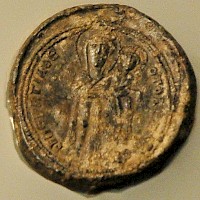Arrian's Anabasis (Photius' Excerpt)
Arrian of Nicomedia (c.87 - after 145): Greek historian and senator of the Roman empire, author of several historical studies. His best-known work is the Anabasis, which deals with Alexander the Great. Arrian is the author of various other philosophical and historical texts.

On this page, you will find a Byzantine excerpt of Arrian's Anabasis, made by Photius (c.815-897). He was one of the greatest scholars of the Byzantine world, and patriarch of Constantinople between 858-867 and 878-886. One of his main publications is the Myrobiblion, a collection of 280 excerpts of all kinds of literature on every possible subject. They were a present to his brother, who had not been there when Photius and his friends read those texts. Photius quotes, summarizes, and excerpts various sources: the Acts of the Councils, the stories about martyrs, but also pagan authors, which would otherwise be unknown. The excerpts and summaries are, therefore, of very great importance to modern classicists and historians.
The text of Photius' excerpts from Arrian's Anabasis is offered here in the translation by J.H. Freese.
The Anabasis
[1] Read the History of the Reign of Alexander by Arrian in seven books. It relates how he made a treaty with the Athenians and the rest of the Greeks with the exception of the Lacedaemonians; how he crossed over into Asia and defeated the Persians in three battles.
[2] At the Granicus he routed the satraps of Darius, who had an army of 20,000 horse and almost as many infantry; at Issus he put Darius himself and his army to flight and captured his wife and children; at Arbela (or Gaugamela) Darius was finally defeated, and while trying to escape was seized and put to death by his own soldiers.
[3] Bessus, who succeeded him, was mutilated and slain by Alexander for his treason towards Darius. How Alexander was wounded seven times in battle and how he carried off the royal treasure at Pasargadae.
[4] Being persuaded that Philotas was conspiring against him, he put him to death with his father Parmenion. Alexander conquers Sogdiana and defeats the Asiatic Scythians. How Clitus was murdered by him in a fit of drunkenness; his remorse when he became sober. Conspiracy of the royal pages against Alexander and their punishment.
[5] The capture of the Sogdian rock and the wife of Oxyartes, the chief of the district, with his daughter Roxane, afterwards the lawful wife of Alexander. How Alexander set out from Bactria against the Indians, defeated them in several battles, and besieged and captured several of their cities. Storming of the rock of Aornus and invasion of the country of the Ascanians.
[6] Having bridged the Indus, Alexander crossed over, defeated Porus, king of India, in a single engagement and took him prisoner. He was generously treated by Alexander, who not only allowed him to keep his kingdom, but actually enlarged it. How the rivers of India, like the Nile, are swollen in summer, but subside in winter.
[7] There was also another Porus, an Indian ruler, a man of bad character, in pursuit of whom Alexander crossed the Hydaspes and subdued the neighbouring Indian tribes, took by siege their large and populous towns, and went on to the Hyphasis. While he was preparing to cross this river, the soldiers began to show signs of discontent, complaining of their toils and endless marches, in consequence of which Alexander left India. Here the fifth book ends.
[8] In the sixth book, the numerous battles and brilliant victories of Alexander on his way home are related. In these engagements he received two wounds besides those already mentioned, and although the seventh wound seemed likely to prove fatal, he eventually recovered. He returned from India by land, Nearchus, with part of the army, being sent back by sea. Both divisions met in Carmania, whence Alexander marched into Persia, Nearchus being ordered to sail to Susiana and the mouth of the Tigris. The voyage of Nearchus is described by Arrian in his Indica, written in the Ionic dialect.
[9] Alexander repairs the neglected tomb of Cyrus, and allows the gymnosophist, Calanus, who was attacked by illness, to put himself to death on the funeral pile. His splendid marriages and those of his generals. His wives were Roxane, Arsinoe [i.e., Barsine], the eldest daughter of Darius, and Parysatis, the youngest daughter of [Artaxerxes III] Ochus. Drypetis, another daughter of Darius, was given to Hephaestion; Amastrine to Craterus; Artacana and Artone, daughters of Artabazus, to Ptolemy and Eumenes; the daughter of Barsine and Mentor to Nearchus; the daughter of Spitamenes to Seleucus. The rest of his friends received in marriage the daughters of the most distinguished Medians and Persians, to the number of eighty.
[10] The discharged Macedonian soldiers were sent home, Antipater being ordered to bring back some of the new levies in their place. Harpalus takes to flight with a large sum of money from the treasury. The death of Hephaestion and the great grief of Alexander; his splendid funeral obsequies.
[11] At the same time ambassadors arrived from Libya and Carthage, and even from Italy, to Alexander, who, when he saw the Italians, predicted the future greatness of their country.
[12] When he wished to advance to Babylon, the seers foretold his death, and when an unknown person unexpectedly sat down on his throne, his end was regarded as still more certain. Nevertheless, he equipped a fleet to operate against the numerous Arabian tribes who believed in only two gods, Uranus and Dionysus. While preparations were being made he was seized with illness and died.
[13] Many contradictory stories are told of his death. He lived thirty-two years and eight months, and reigned twelve years and eight months. Arrian extols him as possessed of almost every virtue.
[14] The seventh book ends here, being continued by the Indica, in one book.